Key takeaways:
- Effective hotel time management requires prioritization, delegation, and the use of technology to meet guest needs efficiently.
- Regular communication and structured routines enhance team coordination and improve response times during busy periods.
- Utilizing appropriate tools, like property management systems and channel managers, streamlines reservation management and enhances guest experiences.
- Self-reflection post-shifts helps identify areas for improvement and promotes a culture of continuous growth among staff.
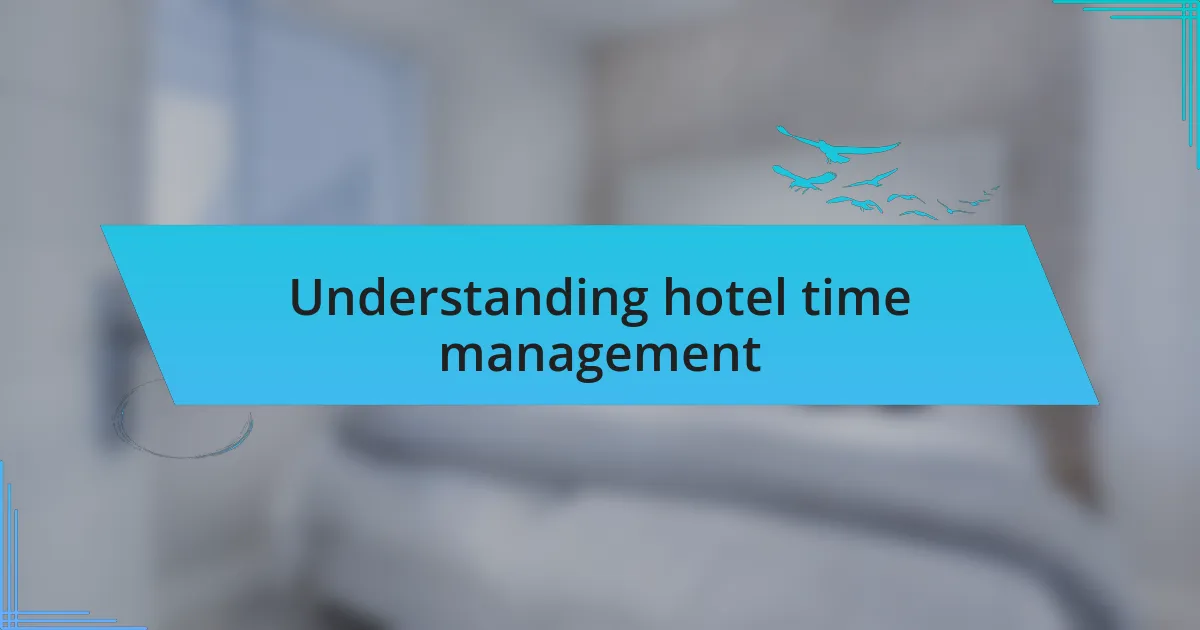
Understanding hotel time management
Understanding hotel time management is essential for creating a seamless experience for both guests and staff. I remember a particularly hectic weekend when a large wedding party checked in; the timing was crucial. Our team had to juggle multiple tasks—ensuring rooms were ready, coordinating events, and satisfying guests’ last-minute requests. It made me realize how efficient time allocation isn’t just about clock-watching; it’s about anticipating needs and acting swiftly.
In my experience, effective hotel time management hinges on prioritization and delegation. I often ask myself, what tasks are most urgent, and who is best suited to handle them? One evening, a mix-up with reservations led to a flood of concerned guests at the front desk. By empowering my colleagues to take on specific responsibilities, we quickly resolved the issue and even turned the situation into a positive experience for everyone involved.
Moreover, the use of technology can significantly enhance time management in hotels. I’ve seen how property management systems streamline operations, making it easier for staff to track bookings and communicate effectively. Have you ever considered how much time could be saved by automating certain processes? I know from experience that integrating new technology can feel overwhelming initially, but the long-term benefits—like reduced errors and improved guest satisfaction—are absolutely worth the investment.
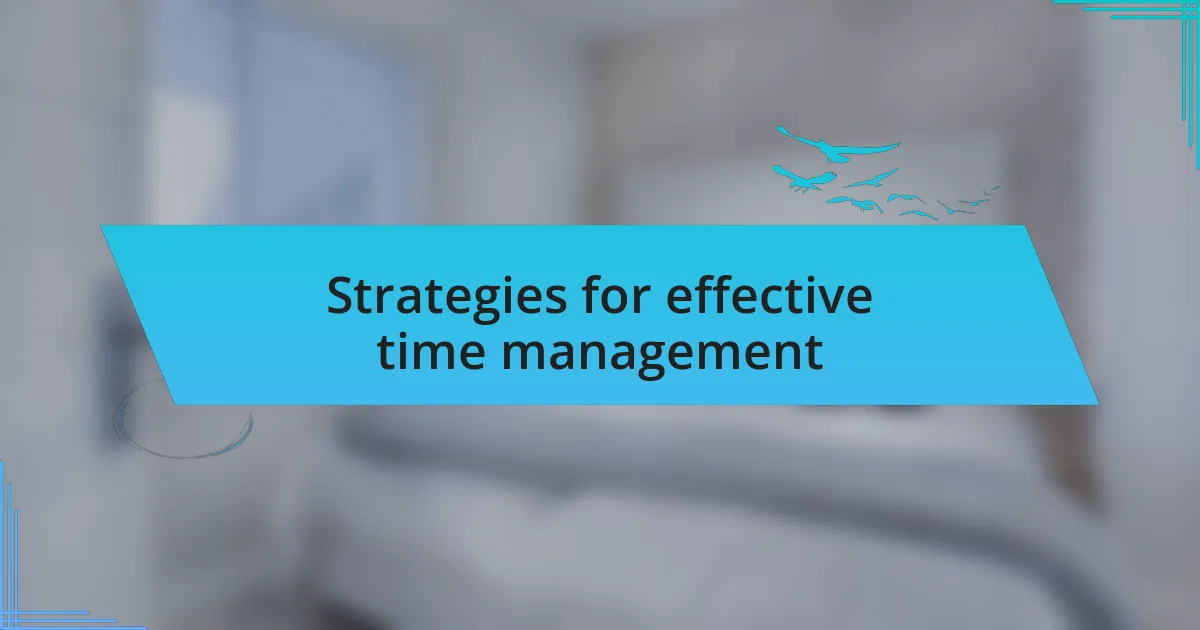
Strategies for effective time management
Effective time management in a hotel setting often hinges on creating structured routines. I’ve found that a well-thought-out daily schedule not only keeps me organized but also allows my team to anticipate peak periods. One afternoon, after implementing a briefing at the start of each shift, I noticed a remarkable difference in how quickly we addressed guest inquiries. Isn’t it fascinating how just a few minutes of planning can save hours later?
In my experience, another key strategy is the art of saying no. I used to think that accommodating every guest request was essential for excellent service. However, there was a moment when I realized that overcommitting led to burnout for my team. By setting clear boundaries and staying focused on our top priorities, we could deliver quality service without compromising our well-being. Have you ever felt overwhelmed by trying to please everyone? Sometimes, the best choice is to prioritize what truly matters.
Lastly, I can’t stress enough the importance of reflecting on and analyzing time management practices regularly. In a busy hotel environment, it’s easy to fall into repetitive patterns. I remember taking a moment after a particularly chaotic week to review what worked and what didn’t. That simple act of reflection helped me identify areas for improvement. How often do we take that time to consider our processes? I’ve learned that consistent evaluation leads to more effective strategies in the long run.
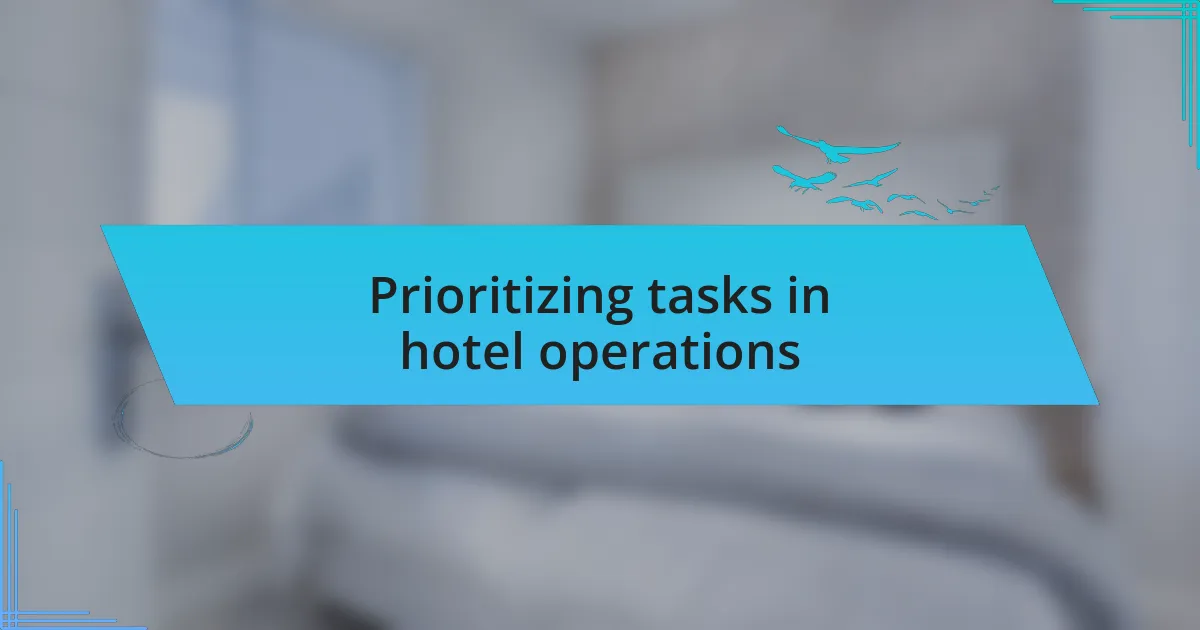
Prioritizing tasks in hotel operations
In hotel operations, prioritizing tasks can make a world of difference during high-pressure moments. I vividly remember a particularly packed weekend when check-ins flooded in simultaneously. By quickly identifying which tasks were essential—like guest check-ins and addressing urgent requests—I was able to delegate responsibilities effectively. Have you ever found yourself in a similar dilemma, where choosing the right tasks under pressure felt like a game-changer?
Communication plays a vital role in prioritization. One evening, as I gathered the front desk and housekeeping teams, we discussed the day’s priorities. I encouraged everyone to voice their observations on what mattered most. This collaborative approach not only empowered the staff but also created a shared sense of purpose. When everyone’s on the same page, tasks not only get executed more efficiently, but the team also feels more cohesive—doesn’t that just enhance the overall work atmosphere?
Understanding the unique needs of guests can also help in setting priorities. For example, I once received a last-minute request from a VIP guest for a special room setup. Instead of seeing this as an inconvenience, I quickly shifted our focus to accommodate this request while ensuring other guests were minimally affected. The excitement of going the extra mile for that guest energised the team and reinforced the culture of exceptional service. Isn’t it rewarding to see how prioritizing the right tasks not only meets guest needs but also boosts morale among staff?
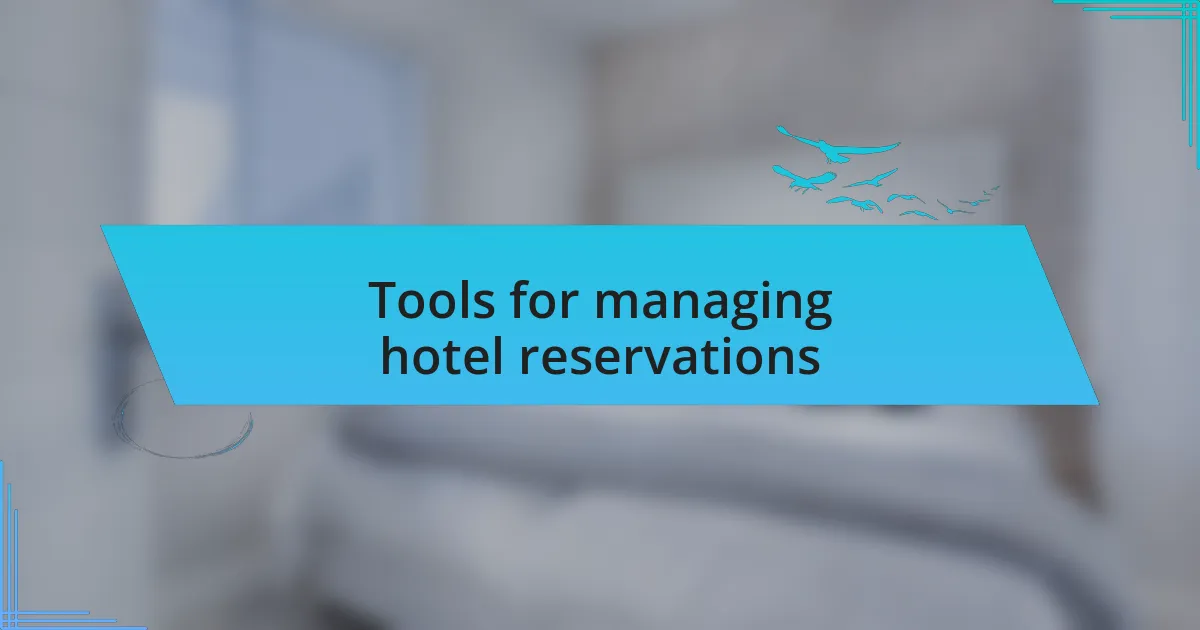
Tools for managing hotel reservations
When it comes to managing hotel reservations, having the right tools can truly make a difference. I recall a time when I switched to a cloud-based property management system. This allowed my team to access reservations in real-time, no matter where we were in the hotel. Have you ever tried a system that keeps you connected and organized at the same time? The ease of managing bookings and cancellations made it feel like I had a personal assistant by my side.
Another invaluable tool I discovered is a channel manager. This software synchronizes all reservation channels—like online travel agencies and the hotel website—into one streamlined platform. I remember a stressful week when a major booking error occurred due to double bookings. Thankfully, the channel manager resolved the issue swiftly, preventing potential guest dissatisfaction. Isn’t it reassuring to know you have technology that keeps things running smoothly?
Additionally, implementing guest relationship management (GRM) software has been a game-changer in personalizing experiences. One time, I used the data to surprise returning guests with a complimentary upgrade, and the look on their faces was priceless. Being able to cater to individual preferences through this tool not only enhances guest satisfaction but also cultivates loyalty. How often do we get the chance to elevate a guest’s experience when we leverage the right tools?
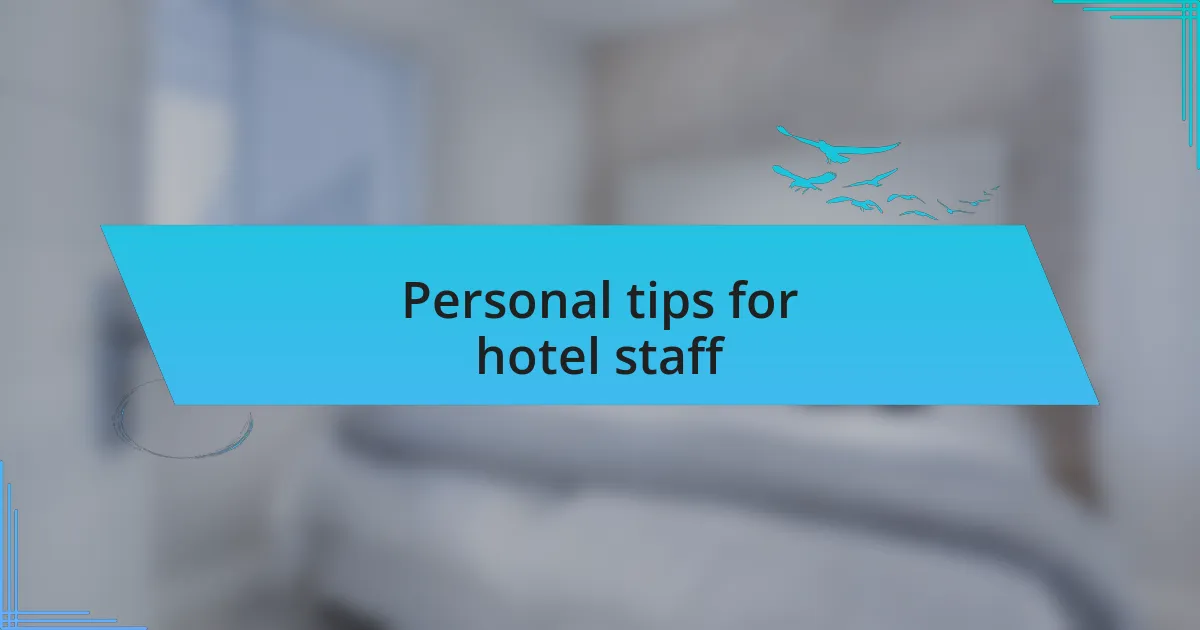
Personal tips for hotel staff
When working in a hotel, I’ve found that effective communication among staff is essential for smooth operations. I remember a hectic weekend when our front desk and housekeeping teams weren’t aligned on check-out times, leading to delays for incoming guests. It was a turning point for me; I learned that regular briefings and clear messaging can prevent little hiccups from escalating into bigger issues. How often do we overlook the simple power of a quick chat?
Another tip is to prioritize tasks based on urgency and impact. There was a day when a large group arrived unexpectedly, and I had to swiftly adjust our plans. By quickly identifying high-priority tasks, like room assignments and special requests, I managed to keep stress levels down and ensure the guests felt taken care of. It’s fascinating how knowing what truly matters can transform a chaotic day into a manageable one.
Lastly, taking a moment each day for self-reflection has been invaluable. For instance, after particularly busy shifts, I’ve found it helpful to jot down what went well and what could be improved. This practice not only sharpens my skills but fosters a mindset of continuous growth. Have you tried reflecting on your daily experiences? You might be surprised by how much you can learn from your own observations.